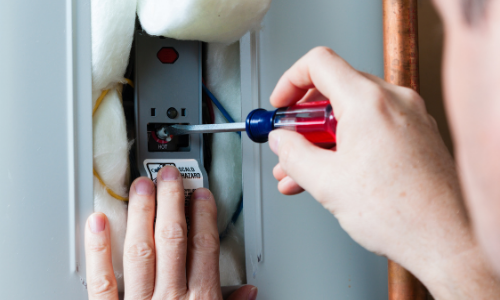We've discovered this post relating to Is Your Water Heater Leaking? listed below on the net and decided it made perfect sense to relate it with you over here.

A water heater is one of the most crucial standard appliances that can be found in a residence. With water heaters, you do not require to undergo the tension of home heating water manually whenever there is a need to take a bath, do the laundry, or the dishes. There is constantly a possibility that your water heater would act up as with the majority of mechanical tools.
It is important to keep in mind any type of little breakdown as well as tackle it swiftly prior to points get out of hand. A lot of times, your hot water heater starts to malfunction when there is an accumulation of sediments as a result of constant usage. As a preventative measure, regular flushing of your water heater is advised to avoid sediment buildup and avoid useful failure.
Common hot water heater emergencies as well as just how to take care of them
Too little warm water
It might be that the water heating unit can't support the warm water need for your apartment or condo. You might upgrade your water heating unit to one with a larger capacity.
Fluctuating water temperature level.
Your water heating system might begin creating water of different temperature levels generally ice scalding or cold hot. There might be a demand to change either the home heating or the thermostat system of your water heating unit.
Leaking water heater storage tank.
A dripping tank could be an indication of deterioration. It could cause damages to the floor, wall as well as electrical devices around it. You can also be at danger of having your apartment or condo flooded. In this scenario, you must turn off your hot water heater, enable it to cool off, and carefully search for the source of the trouble. Sometimes, all you require to do is to tighten a couple of screws or pipeline connections in cases of minor leaks. If this doesn't work and also the leak lingers, you could need to employ the services of a specialist for a proper substitute.
Discolored or odiferous water
When this happens, you require to understand if the problem is from the container or the water source. If there is no funny scent when you run cold water, then you are specific that it is your water heating system that is malfunctioning. The stinky water can be created by rust or the build-up of germs or debris in the water heating system container.
Final thought
Some house owners overlook little warning as well as minor faults in their hot water heater unit. This just brings about further damage as well as a possible total failure of your device. You need to take care of your hot water heater faults as soon as they come up to prevent more costs and unnecessary emergency difficulties.
With water heating systems, you do not need to go through the tension of heating water manually every time there is a demand to take a bathroom, do the laundry, or the meals. It may be that the water heater can not support the warm water need for your apartment or condo. Your water heater can begin generating water of various temperature levels generally ice chilly or scalding hot. If there is no amusing smell when you run cold water, after that you are particular that it is your water heater that is damaged. The smelly water can be triggered by rust or the buildup of germs or debris in the water heating system storage tank.
Common Water Heater Issues and What You Should Do
What Type of Water Heater Do You Have?
Before we begin it’s first important that you identify the type of water heater you have on your property. There are two main types of water heaters out there: conventional and high efficiency.
Both of these types of products typically use either gas or electricity to heat power. There are also solar water heaters that use a thermal collector on the roof or yard to heat the water.
While these models are not as common, they can cut heating costs in half. In this article, we will focus on conventional and high efficiency.
How Do My Electric and Gas Water Heater Work?
Though they look similar, electric and gas water heaters work very differently. It’s important to know their basic function because often problems can be specific to the heating source.
In the electric model, a thermostat on the side of the machine detects the temperature of the water in the tank. When the temperature needs to rise electricity flows to a heating element suspended in the water.
Gas models also use a thermostat device — typically with a mercury sensor at the tip and an additional sensor called a thermocouple. The thermocouple detects whether the pilot light is on and controls the flow of gas.
When the thermostat drops below the appropriate level gas is released which becomes ignited by the pilot light. The flame heats the bottom of the water tank which causes hot water to rise and cold water to drop.
This natural circulation continues until the water reaches the desired temperature. Then, the thermostat triggers the gas control valve to shut off the flow of gas.
What Are the Most Common Issues and How Do You Fix Them?
https://happyhiller.com/blog/common-water-heater-issues-and-what-you-should-do/

We were guided to that write-up about Is Your Water Heater Leaking? from a friend on a different web blog. Appreciated our piece of writing? Please share it. Help someone else find it. Thank you so much for going through it.
Tailored emergency solutions; call now.